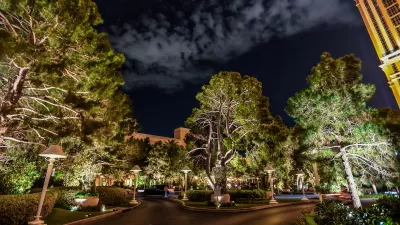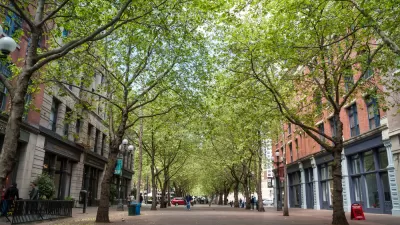With communities balking at the purported ugliness of windtowers and solar panels, a Dutch company proposes using nature's own designs.
"With all the potential good wind power could do for the carbon economy, one of the objections hindering its implementation is aesthetic; people simply don't want massive turbines dotting the landscape and marring their views. The Dutch founder of London's Solar Botanic Ltd. was wrestling with that very issue in 2002 when the idea began to blossom: why not redesign the technology to blend into the natural world?
Founded last year, Solar Botanic's ambitious goal involves layering existing technologies three-fold into the natural form of a leaf and producing fake power-producing trees that individually could power an entire home. Each "nanoleaf" would incorporate photovoltaics for collecting solar power, thermoelectrics for converting the sun's heat to electricity, and piezoelectric nanogenerators in the leaves' petioles (the stalk connecting the leaf to the branch) that capture the kinetic energy from the wind rustling the leaves."
FULL STORY: Pumping Green Power from Fake Plastic Trees

Maui's Vacation Rental Debate Turns Ugly
Verbal attacks, misinformation campaigns and fistfights plague a high-stakes debate to convert thousands of vacation rentals into long-term housing.

Planetizen Federal Action Tracker
A weekly monitor of how Trump’s orders and actions are impacting planners and planning in America.

In Urban Planning, AI Prompting Could be the New Design Thinking
Creativity has long been key to great urban design. What if we see AI as our new creative partner?

King County Supportive Housing Program Offers Hope for Unhoused Residents
The county is taking a ‘Housing First’ approach that prioritizes getting people into housing, then offering wraparound supportive services.

Researchers Use AI to Get Clearer Picture of US Housing
Analysts are using artificial intelligence to supercharge their research by allowing them to comb through data faster. Though these AI tools can be error prone, they save time and housing researchers are optimistic about the future.

Making Shared Micromobility More Inclusive
Cities and shared mobility system operators can do more to include people with disabilities in planning and operations, per a new report.
Urban Design for Planners 1: Software Tools
This six-course series explores essential urban design concepts using open source software and equips planners with the tools they need to participate fully in the urban design process.
Planning for Universal Design
Learn the tools for implementing Universal Design in planning regulations.
planning NEXT
Appalachian Highlands Housing Partners
Mpact (founded as Rail~Volution)
City of Camden Redevelopment Agency
City of Astoria
City of Portland
City of Laramie





























